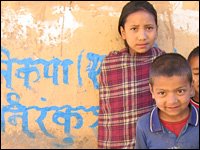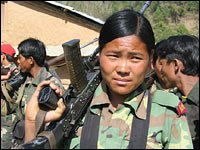Women, Children Feel Effects of Nepal's Insurgency
 NPR
NPRApril 22, 2006
by Doualy Xaykaothao
A communist insurgent stands with other soldiers in preparation for a Maoist event in the Rolpa District in western Nepal. The communists have called for villagers to attend a ceremony to honor women in their "People's War."
Weekend Edition - Saturday, April 22, 2006 · In the Kingdom of Nepal, a communist group calling themselves Maoists have been waging a war against the palace for the last 10 years. A visit to the heartland of the Maoist rebellion in Nepal reveals more about the roots of this decade-long civil war and its effects on women and children.
More than 13,000 have been killed in this war by both Maoists and the Royal Nepalese Army; tens of thousands have been displaced. Compounding that problem, men often leave villages to find work in Kathmandu or other cities, and millions cross over to India to work. Women and children are often left behind with more responsibilities and less protection.
Education has suffered in Maoist-controlled areas such as the Rolpa district in western Nepal. Teachers have to give up to 50 percent of their salary to the insurgents. They also have to teach a Maoist curriculum called the People's Education.
One Maoist leader, who would not give his name, argues that the curriculum is meant to liberate the Nepalese people, who he says have been oppressed by the King. "We have been trying our best, but we are on the struggle, we are trying to first destroy the old regime.
"At this time, we have no time to give attention to the education, like in these sectors. By the way, we hope to give something new to our country after we complete the People's War."
Meanwhile, villagers here just try to get on with their lives. 50-year-old laborer Teeg Bago is building a shed on a lush green field here in Rolpa.

"Well, they say this is a Maoist stronghold," he says, "but we don't know where they are. We stay in the villages, we do labor work, and I keep my family going."
Children try to carry on as well. Sharmila, 12, is grinding spices with a big rock to make dol bat, the traditional Nepalese rice and lentil dish. She is shy, and hesitant to talk, but she enjoys singing with village kids.
Not far from Sharmila, Maoist forces are training for their next battle.
http://www.npr.org/templates/story/story.php?storyId=5356303

0 Comments:
Post a Comment
<< Home